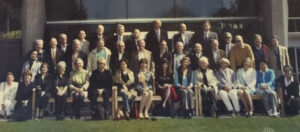
It has been 50 years since the MBA Class of 1970-71 began their studies, but some things never age – the strong bond developed by IMD alumni is one of them.
There are 14 active members of the class who have been meeting every two to three years since 2003. Traditionally the group and their spouses have a reunion in Geneva over a long weekend, but other locations have included Canada, Sweden, Spain and the United Kingdom. For several days, the group catches up over fine food and wine, as well as participating in guest lectures from experts on a variety of topics from technology to economics.
Rodney Habbershaw leads the group, organizing events and keeping the lines of communication open. Between games of golf at his home in Spain, the British national fondly recalled his MBA experience.
“I speak for the whole class when I say that we share a special bond,” said Habbershaw, who went on to spend 25 years as an executive at Heineken International. “Besides the reunions, we speak regularly – something that hasn’t changed much since our MBA days.”
While meeting in person this year was out of the question, Habbershaw organized a virtual 50-year reunion in October just after the IMD All Alumni Event. Although they graduated in 1971, the class decided to celebrate in 2020 – 50 years after they began their studies.
From CEI to IMI to IMD
Of course the name IMD is not half a century old; Habbershaw attended Centre d’Etudes Industrielles (CEI), which was later known as International Management Institute Geneva (IMI). In 1990 IMI merged with Institut pour l’Etude des Méthodes de Direction de l’Entreprise (IMEDE) to form IMD, continuing its global perspective, industry-focused and results-oriented approach from its expanded campus in Lausanne.
While the MBA Class of 1970-71 lived and studied in Geneva in a historic building, Habbershaw finds the current IMD campus impressive. The location may have changed, but the ambition and rich knowledge remain the same.
“There is a feeling of old meets new at IMD in Lausanne, with such advanced facilities,” he said. “Our class was thrilled to be on campus for the first time in 2010 for our reunion.”
A different way of life
The MBA Class of 1970-71 included 42 participants from 17 countries, including one woman. By comparison, the MBA 2020 class includes 89 participants of 47 nationalities, and is made of up 34% women.
“Our class was an interesting mix of nationalities, but nowhere near as gender-diverse as today’s class,” said Habbershaw. “It’s great that there are so many more female participants.”
Back in the ‘70s, 35-40% of the participants were sent by CEI founder Canadian firm Alcan Aluminium, later Alcan Rio Tinto, for international management training. Today, the participants come from a wide range of companies and backgrounds including manufacturing, financial and business management services, energy and technology.
According to the class, what set CEI apart was that it was geared toward business executives that already had significant management experience.
“IMEDE partnered with Harvard and was very case-study driven,” explained Habbershaw, “while at CEI we had the chance to embark on real experiences in the field.”
Some of those were eye-opening for Habbershaw and his colleagues, who had week-long “study trips” to Portugal and former Yugoslavia – in the latter they focused on state-owned companies. For their three-week-long management and consulting assignments, some participants, Habbershaw included, went to Nokia, where they worked on a strategy for the company’s building materials division.
These days, the MBAs have International Consulting Projects for multinationals but also have the opportunity attend a two-week-long Discovery Expedition. During this time they explore the most innovative technical hubs around the world to learn how global digital trends are shaping the future of business.
A common thread
Some things haven’t changed, however, like the institution’s President being a larger-than-life presence that inspired the class with his warmth and support.
“Bohdan Hawrylyshn led the school back in our time,” remembered Habbershaw. “He was quite a character, and although I’ve only met Jean-François Manzoni once, he seems to have those qualities as well.”
Other lecturers in 1970-71 included founder of the World Economic Forum Klaus Schwab, who Habbbershaw remembered as “very systematic”.
Habbershaw’s advice to this year’s participants is to embrace their time at IMD with an open mind.
“My experience at IMD with this incredible group of people – and their energies, their talents, their challenges – was life-changing,” said Habbershaw. “I went from quite a provincial to a collaborative – and anti-Brexit – vision of the world.”

